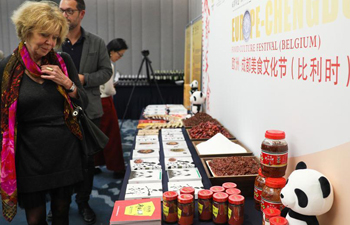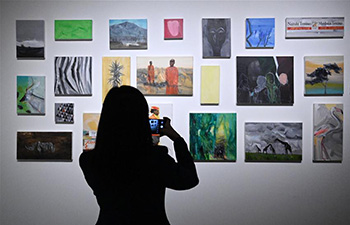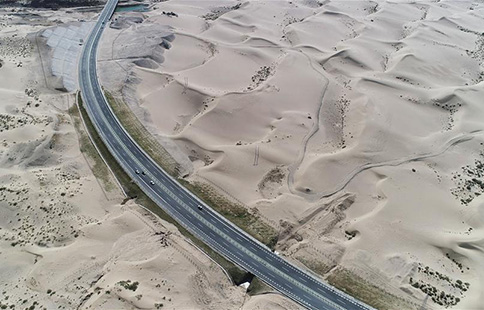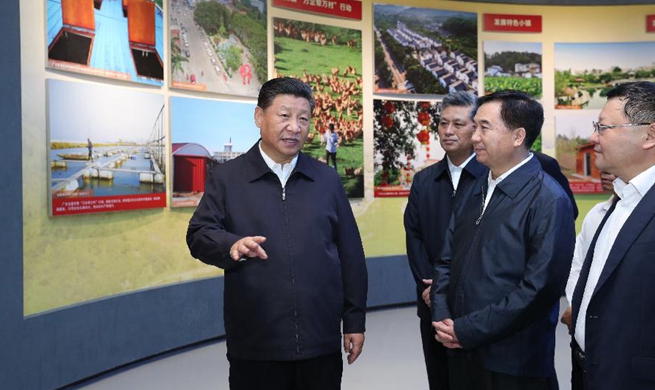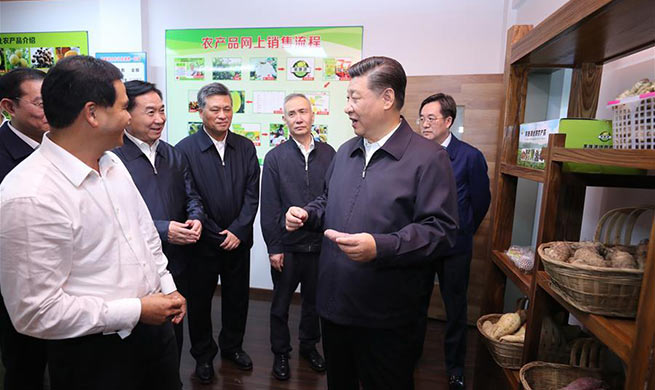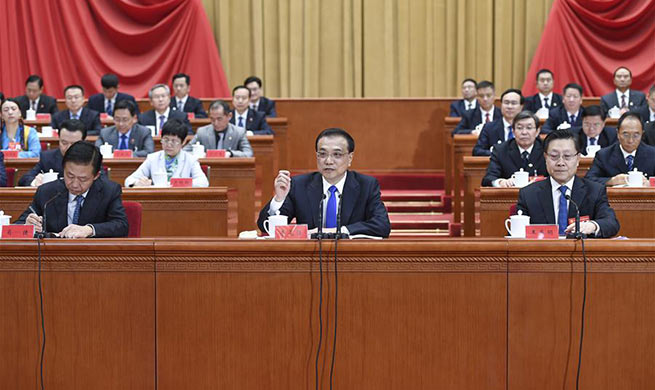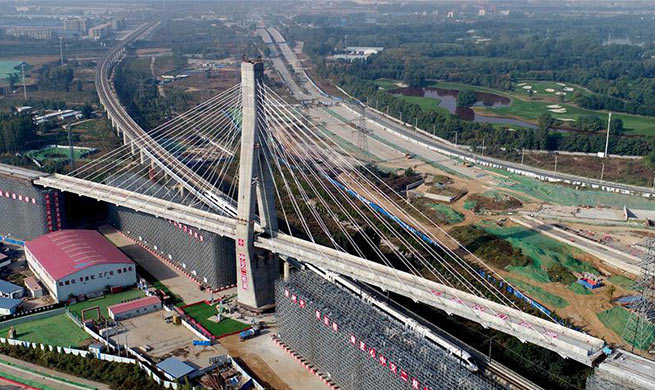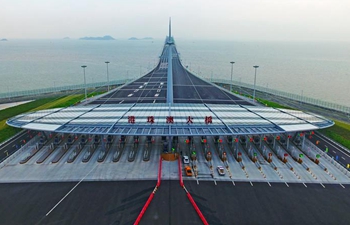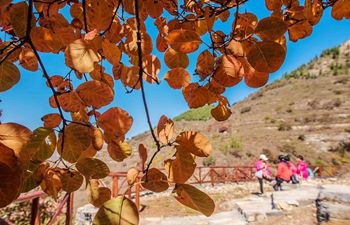by Mahmoud Fouly
CAIRO, Oct. 24 (Xinhua) -- Fast-growing China-Egypt ties that have been elevated in recent years to a comprehensive strategic partnership are strongly supported by Egyptian President Abdel-Fattah al-Sisi and his Chinese counterpart Xi Jinping, Egyptian experts said.
The experts made the comments ahead of an official visit to Egypt by Chinese Vice President Wang Qishan, which is expected to give a further boost to the China-Egypt ties.
FREQUENT HIGH-LEVEL VISITS
The past years have witnessed frequent high-level visits and interaction between Chinese and Egyptian leaders. Sisi visited Beijing in September to attend the summit of the Forum on China-Africa Cooperation (FOCAC), in his fifth visit to China since coming into office in 2014.
Talking with Xi ahead of the FOCAC summit, Sisi hailed the traditional friendship and high-level mutual trust between the two countries, stressing that both leaderships hold similar positions and closely coordinate on major international issues.
He added that Egypt gives high priority to building its comprehensive strategic partnership with China.
For his part, President Xi pledged to continue China's support for Egypt's stability and economic development, expressing willingness to strengthen strategic communication and coordination with Egypt and safeguard the two countries' common interests.
When Xi made a four-state tour of the Middle East in January 2016, he made a key speech to the Arab world in Egypt. Speaking at the Arab League headquarters, Xi unveiled the Chinese vision for the Middle East that offers a fresh approach to the conflict-torn region's thorny issues by highlighting dialogue and development as the core solution.
"The exchange of visits between the leaders of Egypt and China led to the promotion of the level of bilateral ties, boosting economic and trade relations, and increasing the number of Chinese companies operating in Egypt," said Nadia Helmy, a political science professor at Beni-Suef University and an expert in Chinese affairs.
During Xi's visit to Cairo, "the two leaders witnessed the signing of about 21 memorandums of understanding for the purpose of boosting the bilateral relations in various fields as part of the comprehensive strategic partnership," the professor told Xinhua.
ECONOMIC & TRADE COOPERATION
Economically, the strong support of the two leaders to enhance their economic and trade relations led to an increase in the number of Chinese companies investing in Egypt over the past few years, some of them taking part in mega national projects here.
According to Egyptian Minister of Investment and International Cooperation Sahar Nasr, more than 1,500 Chinese companies are currently operating in Egypt in the fields of information technology, power generation, communication, transport and others.
Xu Yuankun, representative of the Cairo office of China Development Bank (CDB), said that at least 123 big Chinese companies have registered at the Chinese Chamber of Commerce in Egypt since it was established in 2004, with total investments in the Arab country reaching 6.2 billion U.S. dollars so far.
China State Construction Engineering Corporation is currently working on a project to build the central business district at Egypt's new administrative capital city, some 50 km east of the capital Cairo. It's the biggest project carried out by a Chinese company in Egypt.
"This shows that the Sino-Egyptian economic relations have significantly developed due to Sisi's frequent visits to China, which resulted in a number of economic and technical cooperation agreements between the two sides," Helmy pointed out.
A coalition of China's AVIC International and China Railway Group Limited is also building a light rail transit connecting Egypt's new administrative capital with other new districts around Cairo.
Several other Chinese companies are partnering with Egypt in the fields of energy and power generation, fish farming and industrial development.
"China is keen on supporting the Egyptian economy and translating its comprehensive strategic partnership with Egypt into several areas of cooperation, by boosting Egypt's industrialization and urging more Chinese companies to invest in Egypt," Egypt's former Ambassador to China Mahmoud Allam told Xinhua.
Based on mutual respect and understanding, "the growing relations also led to cooperation between the central banks of both countries as well as the recent agreements and projects in the fields of infrastructure, energy, fish farming and industrial development," Allam said.
In Ain Sokhna district of Suez province in east of Cairo, Chinese industrial developer Tianjin Economic-Technological Development Area (TEDA) is currently developing a total area of 7.23 square km in Egypt's Suez Canal Economic Zone (SCZone). Having completed the first phase of about 1.25 square km in two years, TEDA is now working on the second phase covering a total area of 6 square km.
Many tenants and enterprises were attracted to the SCZone, including China's fiberglass giant manufacturer Jushi, which has helped Egypt become one of the largest fiberglass producers and exporters in the world over the past couple of years.
In the banking sector, the Central Bank of Egypt and the People's Bank of China signed in late 2016 a currency swap deal worth 18 billion yuan (about 2.6 billion dollars) to bolster economic growth in the North African country.
B&R CONSTRUCTION
With its strategic location connecting the three continents and the vital Suez Canal waterway, Egypt is considered one of the main participants in the China-proposed Belt and Road (B&R) Initiative launched in 2013.
The initiative aims to revive the ancient Silk Road trade routes to link China with other countries in Asia, Africa and Europe through building a trade and infrastructure network.
"China sees Egypt as a main partner in the B&R Initiative due to Egypt's strategic location, its Suez Canal and the SCZone where China's TEDA is located, amid growing win-win cooperation that is one of the main principles of China's foreign policy," Allam said.
At the cultural and educational level, the year 2016 was marked as the Chinese-Egyptian Cultural Year due to the growing cultural interaction between the two nations.
The frequent exchange of visits by cultural delegations and the increased number of joint cultural activities, folklore performances as well as the celebrations of Chinese festivals in Egypt have contributed to the rapid development of the China-Egypt ties.
China's Confucius Institutes, which teach Chinese language and culture, have been set up in a couple of Egyptian universities, including Cairo University and Suez Canal University, serving as a cultural bridge between the two peoples amid the growing relations and partnership.





